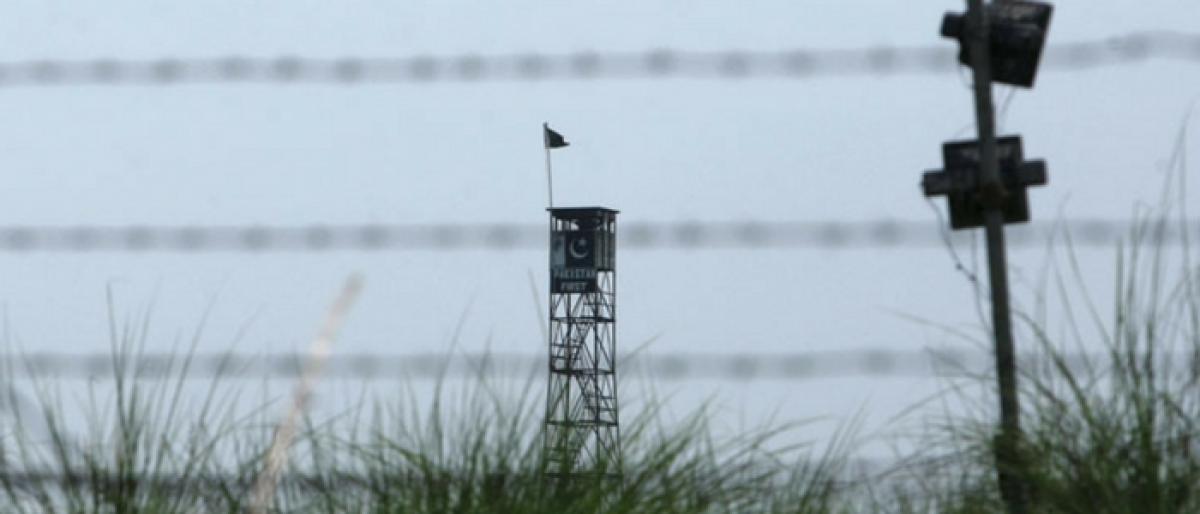Live
- VIP Treatment: Exclusive Benefits for High Rollers in Online Casino
- LS polls: Union Minister Bhagwanth Khuba, Dingaleshwara seer, Priyanka Jarkiholi file nominations in K'taka
- Amid show of strength, Congress’ Praniti Shinde files nomination from Solapur
- Tamil Nadu Police gives clean report to Isha Foundation in missing volunteers case
- Home Minister Amit Shah to address public meeting in Goa on April 24
- Gurgaon Open: M Dharma fires 67 for two-shot lead on penultimate day
- Sharad Pawar made many attempts to finish Shiv Sena, claims Maha minister
- Former England opener Raman Subba Row dies aged 92
- IPL 2024: Impact player rule is affecting the progress of half all-rounders, says Zaheer Khan
- ‘Teppa samudram’ review: Entertains with twists and turns
Just In

The significant outcome at least in the rhetoric of Prime Minister Narendra Modi\'s recent US visit is New Delhi and Washington jointly asking Islamabad to ensure that its territory is not used for cross-border terrorism. But, such a statement of indictment from Uncle Sam does not suffice given the history of American war on terror.
The significant outcome at least in the rhetoric of Prime Minister Narendra Modi's recent US visit is New Delhi and Washington jointly asking Islamabad to ensure that its territory is not used for cross-border terrorism. But, such a statement of indictment from Uncle Sam does not suffice given the history of American war on terror.
Despite President Bush’s assertion that a terrorist is a terrorist whether he is in Kashmir or Kandahar, nothing significant happened on the ground to contain Pakistan-sponsored terrorism. The United States is well aware of the fact that Pakistan is the breeding ground of international terrorism.
India is the victim of export of terror by its hostile neighbour. Yet, America chose Islamabad as the frontline ally in the so-called global war on terror. There is a fundamental difference in how India and US perceive Pakistan.
India considers Pakistan as the architect of terror while Washington perceives it as a victim of terrorism. Despite American President joining Indian Prime Minister in asking Islamabad to not to permit its territory to be used by terrorists, this fundamental difference in perception seems to have not changed.
This is much more appalling despite India under Modi dispensation moving closer to US foreign policy understanding. For the first time, India has joined the US in condemning North Korea. India also aligned with the US on the South China Sea dispute.
India, therefore, quite justifiably expects Washington to reciprocate by doing much more than mere expression of regret over Pakistan’s intransigence in ensuring that its territory is free from terror operations.
Pakistan’s nexus with terror is much more deep-rooted. It’s not that Islamabad is only permitting its geographical territory to be used by terrorists, but the jihadi elements have penetrated deep into the Pakistani ruling establishment.
Exporting terror to India has become a foreign policy agenda of this failed nation. Yet, Washington arms this nation with most modern and sophisticated ammunition. United States refuses to declare Pakistan a terrorist State. India should seek Washington’s explicit response to such concerns of India in regard to Pak-terror nexus.
Probably, annoyed by India bracketing with United States on South China Sea dispute, China has further hardened its stand on the question of terrorism in South Asia. Beijing has taken a preposterous stand when it said that Pakistan is "at the frontline" in the battle against terrorism and the international community should give due recognition to Islamabad.
Chinese stand is more obnoxious given the fact that terrorists originating from Pakistani soil are posing a threat to the secular edifice of this communist nation too. Yet, China chose to give greater priority to its strategic interests in defending Pakistan rather than safeguarding its own security interests.
India should be wary of such geopolitics of terrorism played by the big powers. It has to invent homegrown solutions to tackle the menace of Pak-sponsored terror rather than rely on major powers to be with it in such an hour of concern. Yet, it should continue its diplomatic offensive.
Listen to this Article:

© 2024 Hyderabad Media House Limited/The Hans India. All rights reserved. Powered by hocalwire.com







